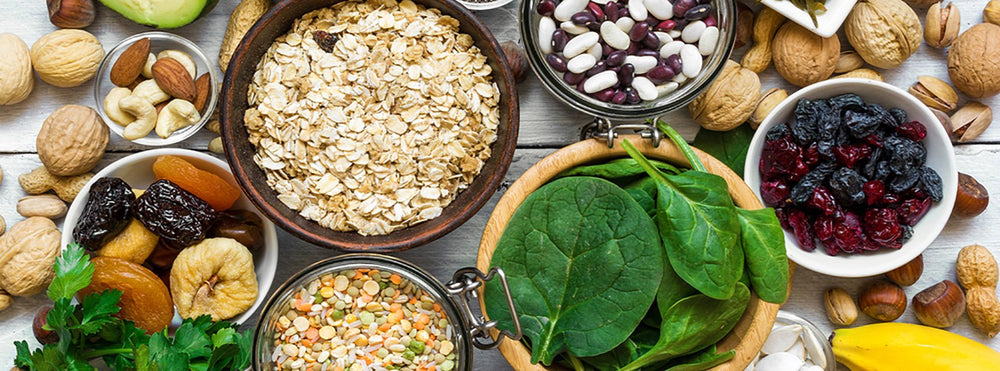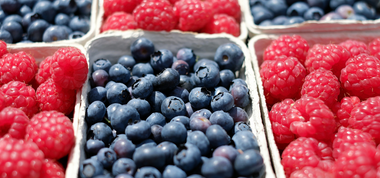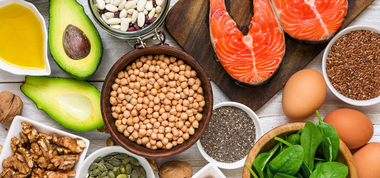Potassium – the mineral you’re not getting enough of

This week’s blog was prompted by a question from a customer who wanted information about the potassium content of our foods. If you’re a regular reader of my blogs, you’re probably pretty familiar with sodium – and the need to cut back on our intake of this mineral. High sodium intake boosts blood pressure.
But did you know that taking in more potassium, a different mineral, can actually help lower blood pressure readings?
Not only does potassium help lower blood pressure (decreasing the risk of stroke and reducing overall mortality), it also protects against loss of muscle mass, preserves bone mineral density, and reduces the formation of kidney stones
And most of us don’t get nearly enough of this mineral in our diets. Adults should consume at least 4,700 milligrams (mg) of potassium a day. Unfortunately, fewer than two percent of Americans get this amount.
In addition, what may be as important as total potassium intake is the ratio of sodium to potassium in the diet – because these minerals work in tandem throughout the body. Research has shown that the higher the sodium-potassium ratio, the greater the chance of dying from cardiovascular disease, heart attack - or any reason at all.
According to the Harvard Health Letter, it is estimated that our Paleolithic hunter-gatherer ancestors took in about 11,000 mg of potassium a day from fruits, vegetables, leaves, flowers, roots, and other plant sources, and well under 700 mg of sodium. That's a sodium-to-potassium ratio of 1 to 16. Today, we get more sodium (3,400 mg) than potassium (2,500 mg), for a ratio that’s upside down and closer to 1.4 to 1.
The best way to get more potassium and less sodium is to eat a whole food plant-based diet. The best single sources of potassium include:
| Food | Standard Amount | Potassium (mg) | Calories |
| Avocado | 1 whole | 975 | 322 |
| Baked sweet potato | 1 medium | 694 | 131 |
| Tomato paste | 1/4 cup | 664 | 54 |
| Beet greens, cooked | 1/2 cup | 655 | 19 |
| Baked potato | 1 medium | 610 | 145 |
| White beans, canned | 1/2 cup | 595 | 153 |
| Nonfat yogurt, plain | 8 oz. | 579 | 127 |
| Banana | 1 medium | 555 | 80 |
Fish and shellfish are also good sources.
The potassium content of step One foods is as follows:
| Step One Foods product | Potassium (mg) | Calories |
| Cranberry Pecan Bar | 260 | 160 |
| Dark Chocolate Crunch Bar | 253 | 170 |
| Anytime Sprinkle | 153 | 120 |
| Blueberry & Cinnamon Oatmeal | 221 | 180 |
| Whole Oats Pancake Mix | 370 | 190 |
| Peanut Butter Cluster | 280 | 190 |
| Strawberry Banana Smoothie Mix | 309 | 140 |
So, with two servings a day, on average, you get 530 mg of potassium from Step One Foods, which is right up there with the richest sources of this mineral. Add a cup of yogurt to your sprinkle and you’re nearly a ¼ way to 4700 mg! With no to minor sodium exposure for 6 of the 7 products (the pancakes contain baking powder, which is necessary for proper cooking) - helping you to improve that sodium to potassium ratio!
A few caveats. Not everyone should have a lot of potassium in their diets. Individuals on dialysis or those with advanced kidney disease actually need to limit potassium consumption. If you’re not sure whether you should be actively trying to increase your intake of this mineral, check with your physician.
Potassium content is not a mandatory component of the nutrition panel so it may be difficult to know how much you’re getting. When in doubt, add plants to your diet. They’re the most reliable repository of this essential nutrient.
Finally, whether potassium from salt substitutes offers the same benefit as potassium from food is an open question. So always err on the side of eating real food, not too much, mostly plants.

Tested & Proven Results.
- Cardiologist formulated
- Supported by over 500 publications
- Clinically-proven, in a double-blind randomized trial with Mayo Clinic and The University of Manitoba
80% of participants lowered their cholesterol in just 30 days. With just two servings per day, Step One Foods offers a proven-effective way to naturally lower LDL (bad) cholesterol.
Get heart health tips and articles like this, delivered right to your email.
New articles every week.
You may also like...

Spring Into Heart Health: The Best Seasonal Foods to Eat Now

Fiber, Plant Sterols, and Omega-3s: Powerful Synergy for Lower Cholesterol

You don’t need to avoid foods with cholesterol…except for these


